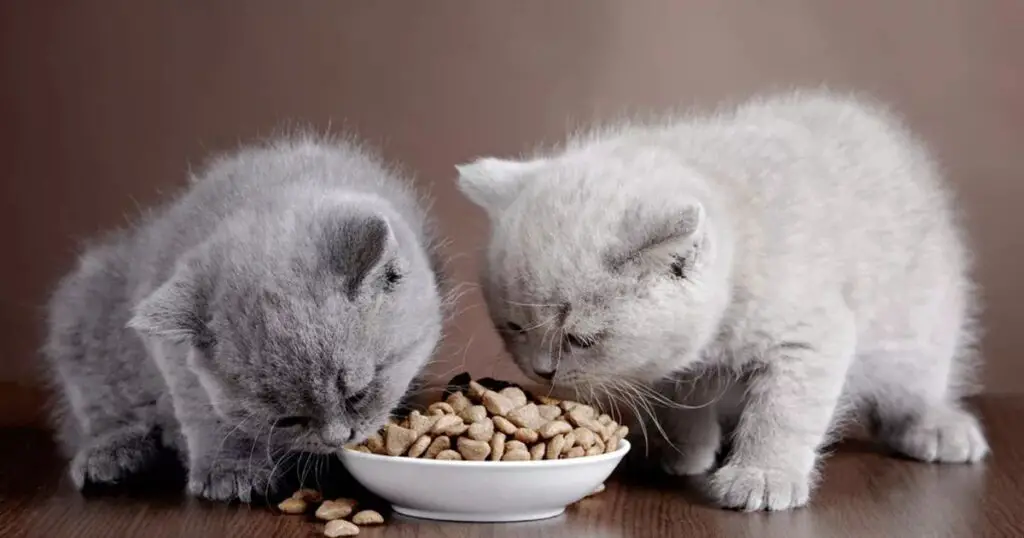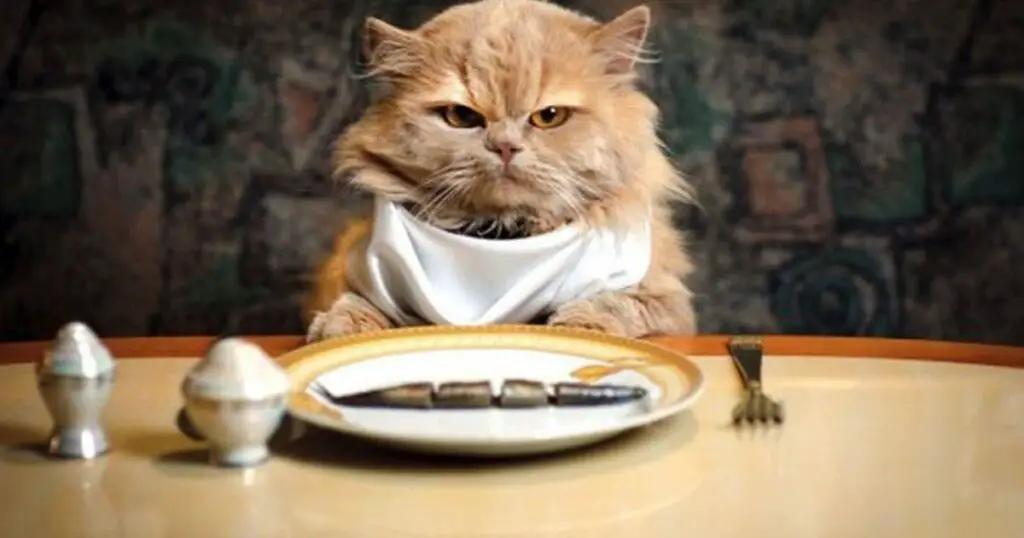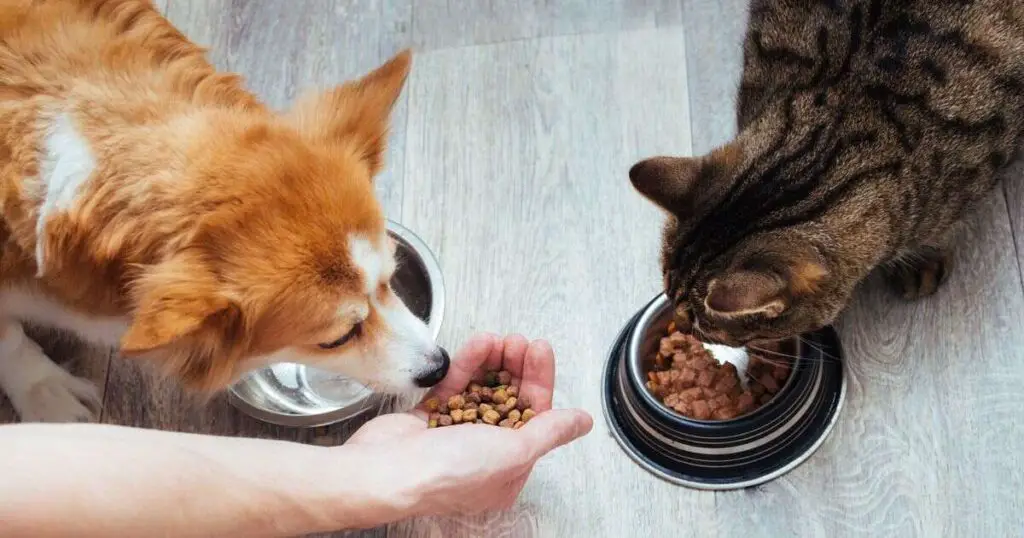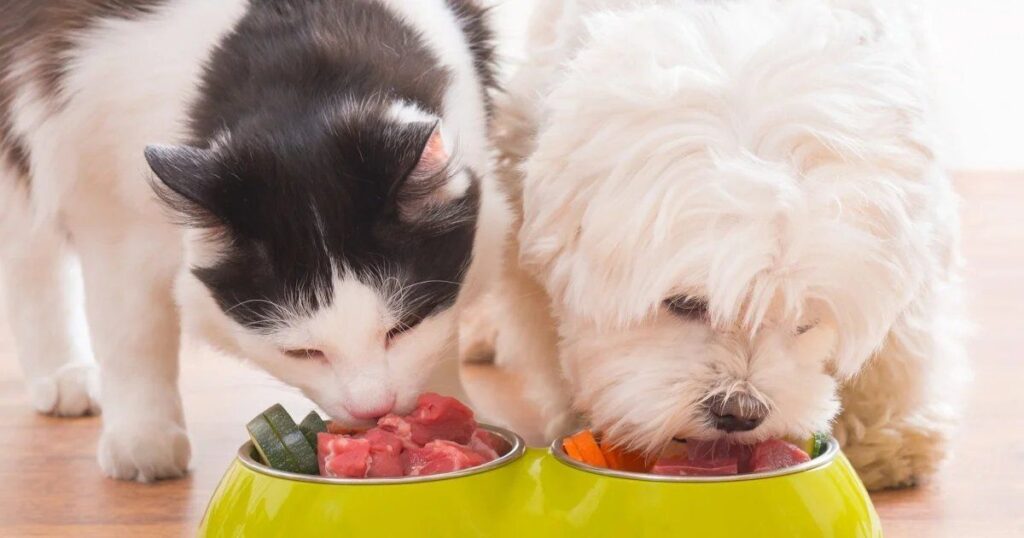As a pet owner, you want the best for your furry friends, but sometimes their curiosity can lead them into places they should not be—like the cat’s food bowl. This raises an important question: Is cat food bad for dogs? In this comprehensive blog post, we will delve into the nutritional differences between cat food and dog food, the potential health risks associated with dogs eating cat food, and what steps to take if your dog indulges in the feline feast. Our aim is to provide you with a detailed understanding to keep your pets healthy and happy.
Understanding the Differences between Cat Food and Dog Food
Proper nutrition is essential for the health and well-being of your pets. Both cats and dogs have specific dietary needs that must be met to ensure they thrive.
While it might seem convenient to let your dog nibble on cat food, it is crucial to understand that cat food is formulated specifically for cats.
Key Nutritional Needs of Dogs vs. Cats
Protein Requirements
Dogs and cats have different protein requirements. Cats are obligate carnivores, meaning they require a diet high in protein to meet their nutritional needs.
Dogs, on the other hand, are omnivores and need a balanced diet that includes proteins, carbohydrates, and fats. Cat food often contains higher levels of protein than dog food, which can be excessive for dogs and lead to health issues.
Fat Content
Fat is another key component where cat food differs from dog food. Cats need more fat in their diet compared to dogs.
While fat is an essential part of a dog’s diet, too much can cause obesity and pancreatitis in dogs. The higher fat content in cat food can thus be detrimental to your dog’s health.
Vitamins and Minerals
Unique nutritional needs of cats and dogs include specific vitamins and minerals. For example, cats require taurine, an amino acid that dogs can synthesize on their own.
Cat food is supplemented with taurine, whereas dog food is not. Additionally, the levels of vitamins A, D, and B are formulated differently in cat food, which might not align with what dogs need.
Common Ingredients Found in Cat Food

High Protein Sources
Cat food is rich in high protein sources like chicken, fish, and beef. This high protein content supports a cat’s muscle maintenance and energy levels.
For dogs, excessive protein can be taxing on their kidneys and lead to long-term health issues.
Fat Sources and Their Benefits
Common fat sources in cat food include fish oil and animal fat, which are crucial for maintaining a cat’s healthy skin and coat.
However, these fats can contribute to weight gain and obesity in dogs if consumed regularly.
Additives and Supplements
Cat food often contains additives and supplements such as taurine, vitamin A, and omega-3 fatty acids. NEW ZEALAND CRICKET TEAM VS PAKISTAN CRICKET TEAM. While these are beneficial for cats, they may not be necessary or suitable for dogs, and overconsumption can lead to imbalances.
Health Risks Associated with Dogs Consuming Cat Food
Digestive Issues
One of the immediate health risks of dogs consuming cat food is digestive issues. Dogs might experience upset stomach, diarrhea, and vomiting due to the richer and higher-fat content of cat food.
Obesity
Obesity is a significant risk for dogs eating cat food. The high-fat content and calorie-dense nature of cat food can cause dogs to gain weight quickly, leading to obesity and related health problems such as joint issues and diabetes.
Nutritional Imbalances
Long-term consumption of cat food can lead to nutritional imbalances in dogs. Dogs have different vitamin and mineral requirements, and an inappropriate diet can cause deficiencies or excesses, leading to serious health issues such as heart disease, kidney problems, and skeletal issues.
Effects of Occasional Consumption vs. Regular Diet

Occasional Consumption
If your dog occasionally eats cat food, the risks are generally lower. A small amount of cat food now and then is unlikely to cause serious harm. However, it is important to monitor your dog for any signs of digestive upset and discourage this behavior to prevent it from becoming a habit.
Regular Diet
Feeding your dog cat food regularly can have serious health consequences. Long-term consumption of cat food can lead to obesity, digestive problems, and nutritional imbalances.
It is crucial to provide a balanced diet specifically formulated for dogs to ensure their overall health and well-being.
What to Do If Your Dog Eats Cat Food
Immediate Steps to Take
If you discover that your dog has eaten cat food, the first step is to assess the situation. Determine how much cat food was consumed and whether it was a one-time occurrence or a regular habit.
Watching for Symptoms
Monitor your dog for any symptoms of digestive distress such as vomiting, diarrhea, or changes in appetite. These symptoms can indicate that the rich cat food is upsetting your dog’s stomach.
When to Call the Vet
If your dog shows signs of serious distress or if you are concerned about the amount of cat food consumed, it is best to contact your veterinarian.
They can provide advice and may recommend bringing your dog in for a check-up.
Preventing Your Dog from Eating Cat Food

Separate Feeding Areas
One of the simplest ways to prevent your dog from eating cat food is to set up separate feeding areas. Ensure that the cat’s food is placed in a location that is inaccessible to your dog, Top cat, and kitten names, such as a higher shelf or a gated area.
Timed Feeding Schedules
Synchronizing feeding times for your pets can help prevent your dog from sneaking into the cat’s food. Feed your dog and cat at the same time but in different locations to reduce the chances of cross-feeding.
Use of Pet Gates and Barriers
Physical barriers such as pet gates can be very effective in keeping your dog out of the cat’s food area. These barriers can be set up to create designated spaces for each pet, ensuring that they stick to their own food.
Frequently Asked Questions
Can cat food make my dog sick?
Yes, cat food can make your dog sick if consumed in large amounts or over a prolonged period. It can cause digestive upset, obesity, and nutritional imbalances.
Is there any cat food that is safe for dogs?
No cat food is formulated to be safe for dogs. Even if it seems harmless in small amounts, it is best to stick to dog food for your dog’s diet.
What are the signs of nutritional deficiency in dogs?
Signs of nutritional deficiency in dogs can include lethargy, poor coat condition, weight loss, and frequent infections. If you suspect your dog is not getting a balanced diet, consult your veterinarian.
Keeping Your Pets Healthy
Maintaining the health and well-being of your pets involves providing them with proper nutrition tailored to their specific needs. Share this article with fellow pet owners to spread awareness, and feel free to comment and share your experiences. For more information on pet nutrition, check out our additional resources on maintaining a healthy diet for your pets.
Conclusion on Whether Cat Food is Bad for Dogs
In conclusion, while cat food is not immediately toxic to dogs, it is not an appropriate long-term diet for them. The higher protein and fat content, along with different nutritional formulations, can lead to health issues if consumed regularly. It is essential to feed your dog a diet specifically formulated for their nutritional needs and to take steps to prevent them from accessing cat food.

Daniel, a seasoned author with 8 years of expertise in SEO, brings a delectable blend of culinary flair and digital finesse to the food niche on his website.



